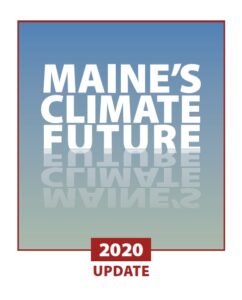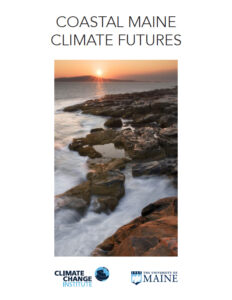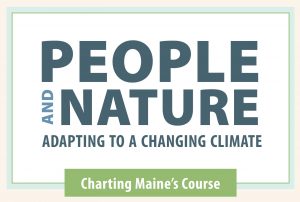Maine's Climate Future
The Earth’s atmosphere is experiencing unprecedented changes that are modifying the global climate, with consequences for all regions and societies. Discussions have begun on how to reduce and eventually eliminate the rapid and accelerating additions of carbon dioxide, other greenhouse gases, and other pollutants to the world’s atmosphere and oceans. These efforts are vitally important and urgent for Maine and the rest of the world.

Maine people are experiencing a changing climate, and they are increasingly recognizing the value of informed decision-making and cost-effective adaptation in concert with the urgency of greenhouse gas mitigation. Ivan Fernandez, Professor of Soil Science School of Forest Resources and Climate Change Institute
Maine's Climate Future - 2020 Update
Maine’s Climate Future 2020 builds on the Maine’s Climate Future 2009 and Maine’s Climate Future 2015 reports and the Coastal Maine Climate Futures report (below); it is not intended as a comprehensive revision of all aspects of the previous reports. This update demonstrates the progression of accelerating change in the climate in Maine and its effects, reflecting dramatic evidence for accelerating climate change around the globe with the often dire consequences of those changes. This report looks at examples of evidence of effects in Maine drawn from the scientific literature and news media accounts of Maine people and their experiences. MCF 2020 highlights some of the many national and international reports over the past several years demonstrating the urgent need to implement aggressive solutions to what many now call the ‘climate crisis’. This report also highlights the importance of simultaneously investing in science-informed, cost-effective adaptation to accommodate the reality of a changing Maine in which we live, work and play. It goes without saying that the many people who contributed to this report or are referenced in this report share a common experience of the escalating consequences of out changing climate. However, it is the generations to come who will pay the highest price, or benefit the most, from the decisions and actions we take now and in the next several years. To that end, the report also points to resources detailing the many people and organizations who have been working to address the climate challenge in Maine, and to the important framework that Maine state government has launched in 2019 to get the job done.
Maine’s Climate Future – 2020 Update
Maine’s Climate Future – 2020 Update – 508 accessible format
Coastal Maine Climate Futures
Climate and weather exert a critical influence on the health of Maine’s people, ecosystems and economy. Across coastal communities, where fishing, forestry, tourism, and agriculture serve as the economic backbone, the changing climate poses near and long-term challenges. This report provides a basis for future planning by developing plausible climate scenarios for the next 20 years – the period 2020–2040. The plausible scenarios follow an examination of historical climate trends, climate–commodity connections, and sources of climate variability that affect Maine. This report was produced with generous support from the Russell Grinnell Memorial Trust.
Maine's Climate Future - 2015 Update
Maine’s Climate Future 2015 builds on the Maine’s Climate Future 2009 report (below); it is not intended as a comprehensive revision of all aspects of the original report. This update focuses on highlights of our understanding in 2015 of past, present, and future trends in key indicators of a changing climate specific to Maine, and recent examples of how Maine people are experiencing these changes. Sometimes the effects are the direct result of shifting temperature or precipitation. Other times, climate-related changes in other parts of the country and world affect Maine, directly or indirectly. Climate change often acts in concert with other stresses, including a changing chemical climate, rather than being a singular cause of any given change. Sometimes these changes represent a new opportunity.
Even if a coordinated response succeeds in eliminating excess greenhouse gas emissions by later in this century, something that appears highly unlikely today, climate change will continue because the elevated levels of carbon dioxide can persist in the atmosphere for thousands of years. What has emerged in the last five years since the initial report in 2009 is a broadening awareness that the changing climate is unfolding around us now, not just in the future, and that citizens are called on to adapt to these changes and prepare for the future. This reality does not diminish the need to dramatically bend the curve on rising greenhouse gas emissions, which is more important than ever. It does mean that both mitigation and adaptation are involved as Maine people move towards sustainability in the 21st century.
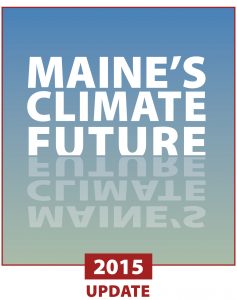 Maine’s Climate Future – 2015 Update
Maine’s Climate Future – 2015 Update
Maine's Climate Future Report
This report considers past change over geologic time, recent evidence of accelerated rates of change, and the implications of continued climate change in Maine during the 21st century as a result of greenhouse gas emissions and their associated pollutants. Even if a coordinated response succeeds in eliminating excess greenhouse gas emissions by the end of the century, something that appears highly unlikely today, climate change will continue because the elevated levels of carbon dioxide (CO2) can persist in the atmosphere for thousands of years to come.
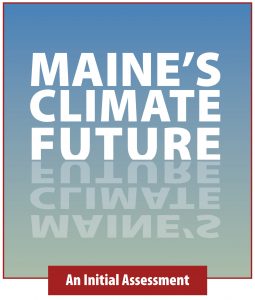 Maine’s Climate Future – An Initial Assessment
Maine’s Climate Future – An Initial Assessment
Maine's Climate Change Stakeholder Adaptation Process
Building on Maine’s Climate Future, in 2009 the Maine Legislature charged the Maine Department of Environmental Protection to bring together a broad group of stakeholders across business, agriculture, forestry, marine, health, conservation, and transportation interests to initiate a climate change stakeholder adaptation process. More than 70 groups representing government, private industry, non-governmental organizations, municipalities, and the University of Maine participated in the discussions and working committees. In February 2010, Maine DEP presented the Legislature with a report on the the initial year of work in this stakeholder adaptation process that included a description of findings and recommendations.


